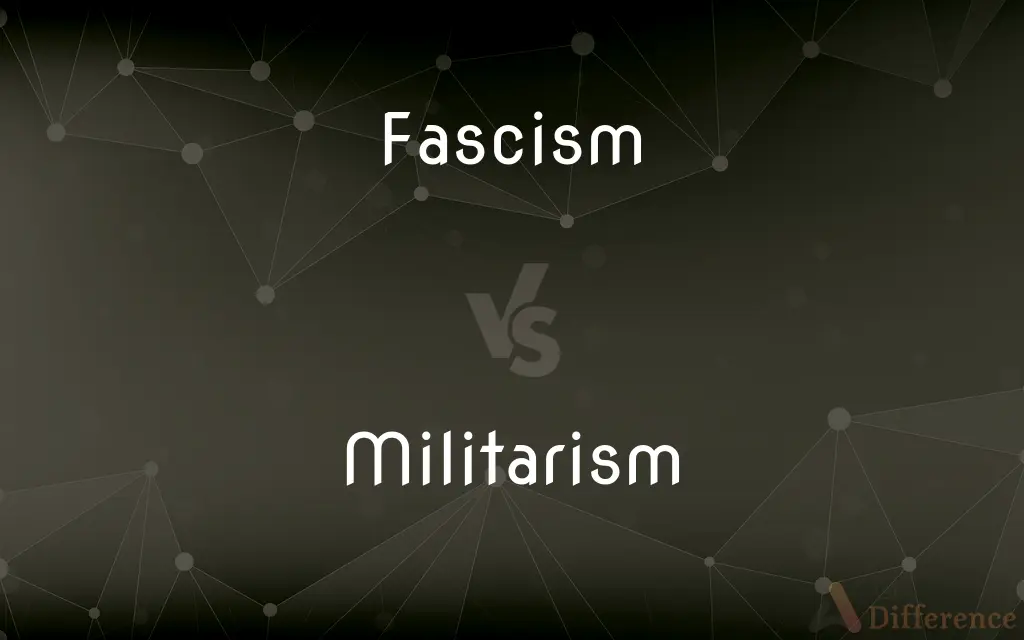Fascism vs. Militarism — What's the Difference?
By Tayyaba Rehman & Maham Liaqat — Updated on March 12, 2024
Fascism is a political ideology emphasizing authoritarian nationalism, while militarism prioritizes military strength and values in society.

Difference Between Fascism and Militarism
Table of Contents
ADVERTISEMENT
Key Differences
Fascism is characterized by dictatorial power, forcible suppression of opposition, and strong regimentation of society and the economy. It often involves the merger of state and corporate leadership, with a focus on nationalist and often racial superiority ideologies. Whereas militarism is the belief or desire of a government or people that a country should maintain a strong military capability and be prepared to use it aggressively to defend or promote national interests.
While fascism inherently includes a nationalist ideology that exalts nation above the individual, militarism does not necessarily involve nationalism or racism but focuses on the glorification of the military and its values. Militarism can exist within various types of governments, including democracies, monarchies, and dictatorships, and does not dictate a specific economic or political structure.
Fascism seeks to forge a unified national community through state control, propaganda, and mass mobilization. It often suppresses dissent and emphasizes conformity and loyalty to the state. Militarism, on the other hand, prioritizes the development and maintenance of military forces and ideals, often influencing government policy and society's values, regardless of the political system in place.
In fascist regimes, the military is a key tool for maintaining control and expanding the nation's power, reflecting the intertwining of militarism within fascism. However, a militaristic society may not adopt fascist policies or ideologies, focusing instead on military efficiency, honor, and the importance of military service without suppressing civil society or eliminating political freedoms.
The economic models under fascism and militarism can also differ. Fascist economies are typically centralized and controlled by the state, often in collaboration with major industrial and financial leaders, to serve national interests. In contrast, militaristic societies may have various economic systems but allocate a significant portion of resources to defense and military spending, potentially at the expense of other public services.
ADVERTISEMENT
Comparison Chart
Definition
A political ideology that emphasizes authoritarian nationalism and dictatorial power.
A belief or desire to maintain a strong military and use it aggressively to defend or promote national interests.
Focus
National unity, state control, and suppression of dissent.
Military strength, values, and the importance of defense and expansion.
Political Structure
Authoritarian, with a centralized government controlling many aspects of life.
Can exist within various political structures, from democracies to dictatorships.
Economic Policy
Centralized economy serving national interests, often with state and corporate collaboration.
Varied economic systems with significant allocation to military spending.
Society's Role
Conformity and loyalty to the state; suppression of opposition.
Glorification of military values and often prioritizing military service.
Compare with Definitions
Fascism
Opposition voices are forcibly silenced.
Fascist governments typically outlaw opposition parties and censor the press.
Militarism
A readiness to use military force to achieve national objectives.
Militarism can lead to a country initiating conflicts to expand its influence.
Fascism
A system where the state has dictatorial control, combined with a focus on national superiority.
Fascist regimes often promote aggressive nationalistic propaganda.
Militarism
Prioritizing military virtues like discipline and honor in society.
In militaristic cultures, military service is often seen as the highest civic duty.
Fascism
The regime mobilizes the population in support of its goals.
Fascist movements often organize large rallies to demonstrate popular support.
Militarism
Allocating a large portion of the national budget to the military.
Militaristic governments spend significantly on arms and soldiers.
Fascism
The integration of state and corporate powers to control the economy.
Fascist economies are characterized by strong ties between the government and big businesses.
Militarism
A belief in maintaining a strong military force.
Militaristic societies invest heavily in defense and military technology.
Fascism
The government controls many aspects of life, including the economy and media.
In fascism, the state dictates economic production and distribution.
Militarism
The military having a significant impact on domestic and foreign policy.
In militaristic states, military leaders often have a say in political decisions.
Fascism
Fascism () is a form of far-right, authoritarian ultranationalism characterized by dictatorial power, forcible suppression of opposition, and strong regimentation of society and of the economy, which came to prominence in early 20th-century Europe. The first fascist movements emerged in Italy during World War I, before spreading to other European countries.
Militarism
Militarism is the belief or the desire of a government or a people that a state should maintain a strong military capability and to use it aggressively to expand national interests and/or values. It may also imply the glorification of the military and of the ideals of a professional military class and the "predominance of the armed forces in the administration or policy of the state" (see also: stratocracy and military junta).
Fascism
An authoritarian and nationalistic right-wing system of government and social organization.
Militarism
Glorification of the ideals of a professional military class.
Fascism
A system of government marked by centralization of authority under a dictator, a capitalist economy subject to stringent governmental controls, violent suppression of the opposition, and typically a policy of belligerent nationalism and racism.
Militarism
Predominance of the armed forces in the administration or policy of the state.
Fascism
A political philosophy or movement based on or advocating such a system of government.
Militarism
A policy in which military preparedness is of primary importance to a state.
Fascism
Oppressive, dictatorial control.
Militarism
An ideology which claims that the military is the foundation of a society's security, and thereby its most important aspect.
Fascism
Any right-wing, authoritarian, nationalist ideology characterized by centralized, totalitarian governance, strong regimentation of the economy and society, and repression of criticism or opposition.
Militarism
A focus on, or excessive use of, military force.
Fascism
Any system of strong autocracy or oligarchy usually to the extent of bending and breaking the law, race-baiting, and/or violence against largely unarmed populations.
Militarism
A military state or condition; a military system; reliance on military force in administering government.
Fascism
Any extreme reliance on or enforcement of rules and regulations.
Militarism
The spirit and traditions of military life.
Fascism
A political theory advocating an authoritarian hierarchical government; - opposed to democracy and liberalism.
Militarism
The view that military strength, efficiency and values should dominate the country's public policy choices and take precedence over other interests.
Fascism
An authoritarian system of government under absolute control of a single dictator, allowing no political opposition, forcibly suppressing dissent, and rigidly controlling most industrial and economic activities. Such regimes usually try to achieve popularity by a strongly nationalistic appeal, often mixed with racism.
Militarism
The policy of maintaining a large military force, even in peacetime; - a term usually used by opponents of such a policy on the assumption that such a large force is unnecessary for national defense.
Fascism
Specifically, the Fascist movement led by Benito Mussolini in Italy from 1922 to 1943.
Militarism
A political orientation of a people or a government to maintain a strong military force and to be prepared to use it aggresively to defend or promote national interests
Fascism
Broadly, a tendency toward or support of a strongly authoritarian or dictatorial control of government or other organizations; - often used pejoratively in this sense.
Fascism
A political theory advocating an authoritarian hierarchical government (as opposed to democracy or liberalism)
Common Curiosities
How do fascism and militarism differ in terms of political structure?
Fascism is inherently authoritarian, while militarism can exist within various political structures.
What is fascism?
A political system that emphasizes authoritarian nationalism and dictatorial power, suppressing opposition.
Can a fascist regime be militaristic?
Yes, many fascist regimes are also militaristic, using military power to enforce control and expand territory.
Does militarism require a dictatorship?
No, militarism can be present in any form of government, including democracies.
How do economic policies differ between fascism and militarism?
Fascist economies are centralized and controlled by the state, while militaristic economies prioritize military spending but can vary in structure.
How does fascism affect individual freedoms?
Fascism significantly restricts individual freedoms, promoting state control and uniformity.
Is nationalism a requirement for militarism?
While nationalism often accompanies militarism, the core of militarism is the focus on military strength, not nationalism.
What is militarism?
A belief in maintaining a strong military force and being prepared to use it aggressively to protect or promote national interests.
Can a society be militaristic without being fascist?
Yes, a society can value military strength and influence without adopting fascist ideologies.
What role does the military play in a fascist government?
In fascism, the military is a key tool for enforcing control and achieving the regime's goals.
What happens to opposition in a fascist regime?
Opposition is suppressed, with dissenting voices censored or eliminated.
Can militarism lead to conflict?
Yes, the aggressive stance of militarism can increase the likelihood of initiating conflicts.
Is militarism always negative?
Perspectives on militarism vary; some view it as necessary for national security, while others see it as leading to unnecessary aggression and conflict.
How does society view military service in a militaristic culture?
Military service is highly valued and often considered a key civic duty.
What is the main goal of militarism?
The main goal is to strengthen military capability and readiness for use in defense or aggression.
Share Your Discovery

Previous Comparison
Module vs. Class
Next Comparison
Cyclotron vs. BetatronAuthor Spotlight
Written by
Tayyaba RehmanTayyaba Rehman is a distinguished writer, currently serving as a primary contributor to askdifference.com. As a researcher in semantics and etymology, Tayyaba's passion for the complexity of languages and their distinctions has found a perfect home on the platform. Tayyaba delves into the intricacies of language, distinguishing between commonly confused words and phrases, thereby providing clarity for readers worldwide.
Co-written by
Maham Liaqat













































